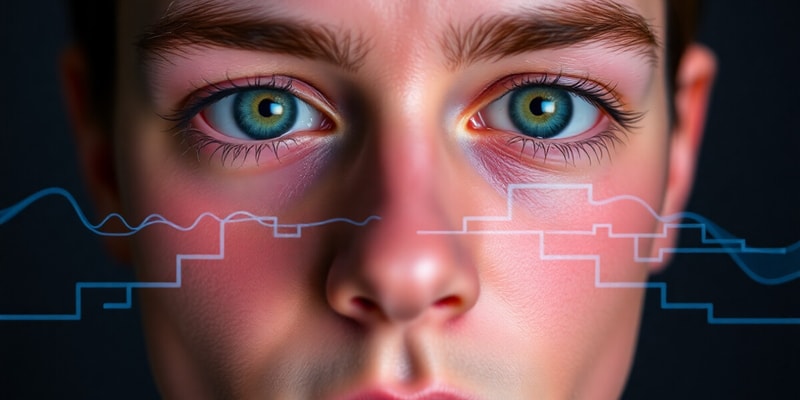Podcast
Questions and Answers
What percentage of individuals are considered easily hypnotized?
What percentage of individuals are considered easily hypnotized?
Which of the following groups has been found to be more likely to be hypnotized?
Which of the following groups has been found to be more likely to be hypnotized?
Which of the following describes meditation?
Which of the following describes meditation?
What is a benefit associated with meditation?
What is a benefit associated with meditation?
Signup and view all the answers
Which outcome is linked to mindfulness?
Which outcome is linked to mindfulness?
Signup and view all the answers
What does sensation primarily refer to?
What does sensation primarily refer to?
Signup and view all the answers
How is perception best defined?
How is perception best defined?
Signup and view all the answers
What is the term for the minimum level of energy required to detect a stimulus?
What is the term for the minimum level of energy required to detect a stimulus?
Signup and view all the answers
Which of the following describes the relationship noted by Gustav Fechner in psychophysics?
Which of the following describes the relationship noted by Gustav Fechner in psychophysics?
Signup and view all the answers
In the context of sensation and perception, what does a stimulus refer to?
In the context of sensation and perception, what does a stimulus refer to?
Signup and view all the answers
What distinguishes absolute thresholds from difference thresholds?
What distinguishes absolute thresholds from difference thresholds?
Signup and view all the answers
Which example best illustrates the concept of perception?
Which example best illustrates the concept of perception?
Signup and view all the answers
Which two types of thresholds are identified in relation to sensation and perception?
Which two types of thresholds are identified in relation to sensation and perception?
Signup and view all the answers
What characterizes waking consciousness?
What characterizes waking consciousness?
Signup and view all the answers
Which of the following is a common cause of altered states of consciousness?
Which of the following is a common cause of altered states of consciousness?
Signup and view all the answers
What is meant by 'theory of mind'?
What is meant by 'theory of mind'?
Signup and view all the answers
Which statement about hypnosis is correct?
Which statement about hypnosis is correct?
Signup and view all the answers
What is a challenge in studying consciousness?
What is a challenge in studying consciousness?
Signup and view all the answers
Which of the following statements is NOT true about hypnosis?
Which of the following statements is NOT true about hypnosis?
Signup and view all the answers
Which is an example of an altered state of consciousness?
Which is an example of an altered state of consciousness?
Signup and view all the answers
How many individuals may have difficulty being hypnotized?
How many individuals may have difficulty being hypnotized?
Signup and view all the answers
What occurs during Stage N2 sleep?
What occurs during Stage N2 sleep?
Signup and view all the answers
Which of the following best describes Stage N3 sleep?
Which of the following best describes Stage N3 sleep?
Signup and view all the answers
Which sleep stage is most associated with dreaming?
Which sleep stage is most associated with dreaming?
Signup and view all the answers
What percentage of total sleep time do adults spend in REM sleep?
What percentage of total sleep time do adults spend in REM sleep?
Signup and view all the answers
What is the recommended sleep duration for 3-5 year olds?
What is the recommended sleep duration for 3-5 year olds?
Signup and view all the answers
What is indicated by sleep deprivation?
What is indicated by sleep deprivation?
Signup and view all the answers
How often do brain waves change during sleep?
How often do brain waves change during sleep?
Signup and view all the answers
Which age group has the lowest recommended hours of sleep?
Which age group has the lowest recommended hours of sleep?
Signup and view all the answers
What is one possible effect of minor sleep deprivation?
What is one possible effect of minor sleep deprivation?
Signup and view all the answers
Which of the following is NOT a consequence of long-term sleep deprivation?
Which of the following is NOT a consequence of long-term sleep deprivation?
Signup and view all the answers
How do circadian rhythms influence human behavior?
How do circadian rhythms influence human behavior?
Signup and view all the answers
Which factor can impact circadian rhythms aside from light and dark cycles?
Which factor can impact circadian rhythms aside from light and dark cycles?
Signup and view all the answers
What is a potential consequence of jet lag?
What is a potential consequence of jet lag?
Signup and view all the answers
What is recommended as a strategy for better sleep?
What is recommended as a strategy for better sleep?
Signup and view all the answers
What role does the suprachiasmatic nucleus play in circadian rhythms?
What role does the suprachiasmatic nucleus play in circadian rhythms?
Signup and view all the answers
How can circadian rhythms impact health disparities, particularly among different ethnic groups?
How can circadian rhythms impact health disparities, particularly among different ethnic groups?
Signup and view all the answers
Study Notes
### Sensation and Perception
- Sensation is the activation of sense organs by physical energy.
- Perception is the process of interpreting and integrating stimuli.
- Stimuli can vary in type and intensity.
Psychophysics
- Gustav Fechner established psychophysics, studying the relationship between physical stimuli and subjective experiences.
- Experiences in the mental world are not linearly related to changes in physical stimuli.
Thresholds
- Threshold: Minimum level of energy required for a stimulus to be detected.
- Absolute threshold: Minimum amount of stimulation an individual needs to detect a stimulus 50% of the time.
- Difference threshold: Smallest difference between two stimuli that can be detected 50% of the time (also known as just noticeable difference).
Consciousness
- Consciousness: Our subjective awareness of sensations, thoughts, and feelings.
- Waking consciousness: State of being awake and aware of internal and external stimuli.
- Altered states of consciousness: States where awareness of thoughts, emotions, and perceptions are diminished. Examples include sleep, hypnosis, meditation, and drug-induced states.
Theory of Mind
- The ability to recognize one's own mental states and attribute mental states to others.
Studying Consciousness
- Challenges include the subjective nature of consciousness and difficulty in objectively measuring it.
- Contemporary psychologists utilize various methods for scientific study of consciousness.
Hypnosis
- Hypnosis: A trance-like state of heightened suggestibility.
- Hypnosis does not: Compel people to lose free will, perform antisocial acts, reveal hidden truths, or be hypnotized against their will.
- Potential benefits: Pain management, anesthesia, reducing allergic responses, treating irritable bowel syndrome, and lowering blood pressure.
Susceptibility to Hypnosis
- 5-20% of people are highly resistant to hypnosis.
- 15% are easily hypnotized, often daydreamers and easily absorbed in activities.
- Females and outgoing individuals tend to be more susceptible.
Meditation
- Meditation: A technique for refocusing attention, potentially inducing altered states of consciousness.
- Often involves repetition of a mantra for mental focus.
- Mindfulness: Being present and aware of surroundings.
Benefits of Meditation
- Relaxation, stress management, self-insight, lower heart rate and blood pressure, reduction in chronic pain, potential benefits for substance use disorders.
Sleep and Stages of Sleep
- Sleep: A cyclical process involving various stages with unique brain wave patterns and physical activity changes.
-
Sleep Stages:
- Stage N1 (Non-REM1) Sleep: Transition from wakefulness to sleep, light sleep.
- Stage N2 (Non-REM2) Sleep: Deeper sleep characterized by reduced muscle activity, body temperature, and heart rate regulation.
- Stage N3 (Non-REM3) Sleep: Deepest sleep, least responsive to external stimuli.
- Stage R (REM) Sleep: Rapid eye movement, dreaming is most likely, brain activity similar to wakefulness, muscle paralysis.
Sleep Requirements by Age
- Recommended sleep hours vary by age.
Sleep Deprivation
- Sleep deprivation: Insufficient sleep.
- Minor sleep deprivation: Causes fatigue, irritability, concentration issues, reduced creativity, and impaired performance on academic and physical tasks.
- Long-term sleep deprivation: Can lead to pain, increased risk of cardiovascular disease, aggression, hallucinations, and in extreme cases, fatal familial insomnia, a genetic sleep disorder.
Circadian Rhythms
- Circadian Rhythms: Biological processes that occur on a 24-hour cycle, influenced by light/dark cycles, food, stress, physical activity, social environment, and temperature.
- Regulated by the suprachiasmatic nucleus in the hypothalamus.
- Examples include sleep, wakefulness, and body temperature.
- Jet lag: Disruption of circadian rhythms due to crossing time zones, causing fatigue, irritability, and errors.
Strategies for Better Sleep
- Increase daytime exercise.
- Maintain a regular bedtime routine.
- Use the bed only for sleep.
Studying That Suits You
Use AI to generate personalized quizzes and flashcards to suit your learning preferences.
Related Documents
Description
Explore the foundational concepts of sensation, perception, and psychophysics in this quiz. Understand the thresholds associated with stimuli and how they affect our conscious awareness. Gain insights into the principles established by Gustav Fechner and the role of consciousness in interpreting sensory information.



